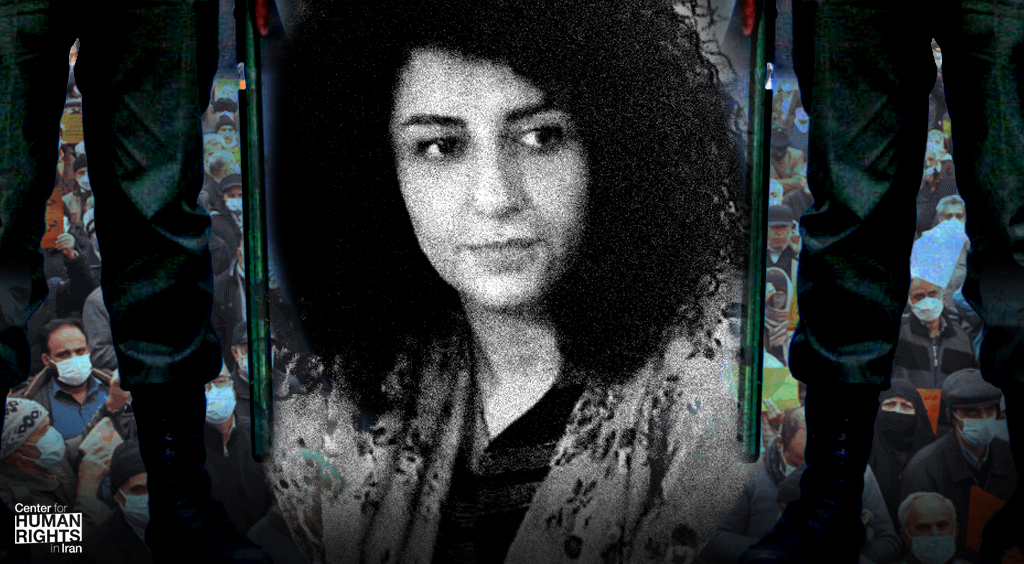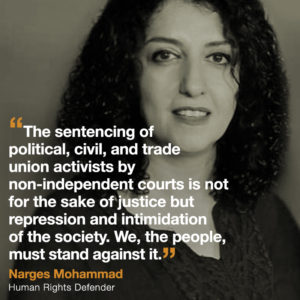Civil Disobedience: Rights Defender Narges Mohammadi Resists Prison Summons
 Growing Civil Society Movement Refuses to Accept Unlawful Rights Violations
Growing Civil Society Movement Refuses to Accept Unlawful Rights Violations
Longtime human rights defender and former prisoner of conscience Narges Mohammadi is peacefully refusing to report to prison in Tehran to serve an eight-year sentence that was issued against her after a five-minute trial.
She announced the news using the Farsi-language hashtag “نافرمانی_مدنی#”, which means civil disobedience.
The peaceful political protest campaign has emerged against a backdrop of the wider “Seeking-Justice” movement, which includes former political prisoners, relatives of political prisoners who were executed in the 1980s, a group of mothers whose children were executed or killed by state security forces, and relatives of some of the 176 passengers who were killed on board the Ukrainian plane that was shot down in Iranian airspace by the Islamic Revolutionary Guard Corps.
“I do not accept the verdicts against me, and now I am on the sixth day of absence and rebellion against returning to prison,” Mohammadi wrote on Instagram on March 18, 2022.
“I will disobey the prosecutor’s order to return to prison as long as my rebellion and disobedience do not lead to the confiscation of my guarantor’s property,” said Mohammadi, who remained at home as of the writing of this article on March 23.
Mohammadi’s “guarantor” had previously posted bond to secure her release from prison at 500 million tomans (about $120,000).
Independent journalist Hossein Razzagh tweeted that he has also refused to report to prison.
“Two days ago I received a warrant for the enforcement of one of the sentences against me, giving me five days to report [to prison],” he wrote on March 17. “But the orders of a judiciary that is the arm of oppression, and its only mission is injustice, should not be obeyed. I will not surrender myself to any place…”
 Razzagh is facing two sentences of six months each by the Revolutionary Court, one in Tehran and another in Amol, a city in northern Iran, for his written commentaries on political affairs, including his boycott of last year’s presidential elections. The sentences have been upheld on appeal.
Razzagh is facing two sentences of six months each by the Revolutionary Court, one in Tehran and another in Amol, a city in northern Iran, for his written commentaries on political affairs, including his boycott of last year’s presidential elections. The sentences have been upheld on appeal.
“The sentencing of political, civil, and trade union activists by non-independent courts is not for the sake of justice, but repression and intimidation of the society,” wrote Mohammadi on Instagram.
“We, the people, must stand against it not only to realize the ‘right’ but also to fulfill our ‘duty’ and show our authority in the face of the illegitimate government,” she said.
Like other prominent activists, Mohammadi has been jailed repeatedly in Iran; she has in fact spent the better part of the last 13 years (from 2009 to 2013 and from 2015 to 2020) behind bars for her peaceful rights advocacy.
The authorities have used similar tactics against other human rights defenders, for example, with the defense attorney Nasrin Sotoudeh, the activist Atena Daemi and Golrokh Iraee Ebrahimi, and the teachers’ rights advocate Esmail Abdi, just to name a few, issuing new convictions continuously to keep them behind bars.
Mohammadi has proved to be a particular thorn in the authorities’ side, refusing to be silent either in prison or during her brief periods of release between convictions.
She had already been serving a 30-month sentence at Gharchak Prison after she organized a sit-in at Evin Prison’s Women’s Ward to condemn the killing of hundreds of protesters by state security forces during the November 2019 protests, and the unjust execution of wrestler Navid Afkari.






